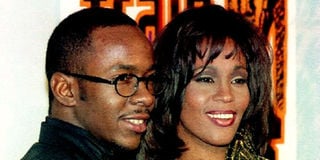How Bobby Brown drove Whitney Houston to an early grave

Whitney Houston (right) with her husband, Bobby Brown, at Eighth Annual Soul Train Music Awards on March 15, 1995
What you need to know:
- Bobby would book hotel rooms on different floors so that he could sleep with other women while Whitney sank deeper into depression.
- He and his friends, would laugh at and taunt Whitney's drug-induced dysfunctional and sorry state.
Whitney Houston's songs – You give good love, My love for you, Greatest love of all and Saving all my love for you, from her self-titled inaugural February 1985 studio album – all peaked at number one on the Billboard charts.
The multi-platinum album became the biggest-selling record by a solo female artist, with over 14 million copies sold, earning a diamond certification credential.
Unfortunately, Whitney's negative childhood environment was dominated by racism and colourism. Her temperamental and hostile mother, Cissy Houston, further strained her profoundly sensitive persona and she began snorting cocaine at the age of 14.
At 16, Whitney was abruptly contracted by modelling agency Click Models after one of its agents spotted her striding with Cissy in Manhattan, New York. She went on to become the third black woman to ever appear on the cover of the vastly popular Seventeen magazine.
By the time she met her future personal assistant, Robyn Crawford, in Newark, New Jersey, in 1980, Whitney was already an addict. She was 16 and snorting cocaine, smoking cigarettes, marijuana and mixing tobacco with hashish.
Robyn's memoir, A song for you: My life with Whitney Houston, is about her futile attempt to save Whitney from addiction and domestic violence. A master of soprano and alto, Whitney's vocals were immaculate in conception and execution, and she recorded all the songs in her first album in one take. She acquired the pseudonym One-Take Houston amongst music producers, after she signed a recording contract with Arista Records in 1980.
When Whitney met New Edition musician Bobby Brown at the 1989 Soul Train Music Awards in Los Angeles, she had just ended a relationship with Michael Jackson's married brother, Jermaine, and had begun dating comedian Eddie Murphy, who often failed to appear for scheduled dates.
After her wedding to Bobby at the Royal Hotel in Manhattan, Whitney returned from their honeymoon in Capri, Italy, with a three-inch-long scar that ran from the top of her cheek to her jaw. It was inflicted by Bobby during a vicious battery.
She was beginning to have strong symptoms of cocaine addiction. She'd wake up with swollen and rapidly blinking eyes and dry mouth while speaking incoherently. She also had an intense craving for cocaine and was alarmingly losing weight.
Her three international tours – The Greatest Love tour after her first album, Moment of Truth World tour after her second album, and I'm Your Baby Tonight tour after her third album – were egregiously drug-infused projects.

The cover of A song for you: My life with Whitney Houston by Robyn Crawford.
Her tours had a persistent influx of narcotics, with no quality control to raise the alarm on the severity of the situation. Drug dealers stationed themselves at every venue and hotel, ready to capitalise on her entourage’s arrival. Stage producers were the first to know where to purchase and indulge in drugs, because they were the first to arrive.
Whitney's brothers, Michael and Gary, ended up being her main suppliers of cocaine. Michael introduced her to a stronger version called crack. It was so addictive and damaging that Whitney struggled to complete the eight-month filming of her onscreen motion picture debut, The Bodyguard, and the preceding movies: Waiting to Exhale and The Preacher's Wife. The filming difficulty was often worsened by Bobby Brown's viciously emotional and physical abuse.
On one occasion, Whitney flew from New Jersey to Atlanta to surprise her husband, who was on a tour with New Edition. Bobby ended up hocking a loogie and spat the mucus on Whitney’s face, before viciously assaulting her at Ritz-Carlton Hotel with a telephone receiver until she was concussed. The pattern of assault was outrageous and eventually became the norm.
Her marriage was extinguishing the little self-esteem that was left within her to attend rehab, as her crack use skyrocketed. Bobby had numerous opportunities to assist and help Whitney but was constantly operating in a state of normalcy around her addiction. Worsening his salacious behaviour, he, alongside his friends, would laugh at and taunt Whitney's drug-induced dysfunctional and sorry state. Her physique had been reduced to skin and bones.
Whenever they travelled, Bobby would book hotel rooms on different floors so that he could sleep with other women while Whitney sank deeper into depression. Besides Robyn, nobody else appeared concerned about Whitney. Unfortunately, Robyn had no autonomy to enforce regulations.
She reported the gravity of Whitney's grisly condition to John Houston, Whitney's father and personal manager, and Cissy, but they refused to help. Instead, John contracted a criminal to break Robyn's kneecaps using a baseball bat, a felony that was fortunately never executed.
Robyn then convinced Whitney to join New York's Silver Hill rehabilitation centre, but the singer changed her mind when she was scheduled to depart. Bobby, who was against Whitney's rehabilitation, assaulted her, repeatedly jumped on top of her brand new black Porsche car and smashed it, before demanding that she dismiss Robyn. On February 11, 2012, Robyn received a dreaded phone call informing her that Whitney had died.
The reviewer is a novelist, a Big Brother Africa 2 Kenyan representative and the founder of Jeff's Fitness Center (@jeffbigbrother).





